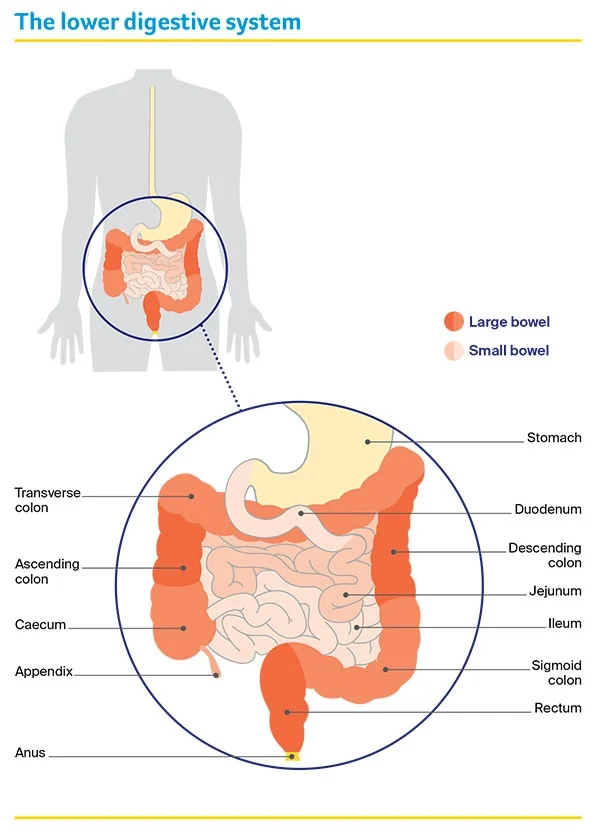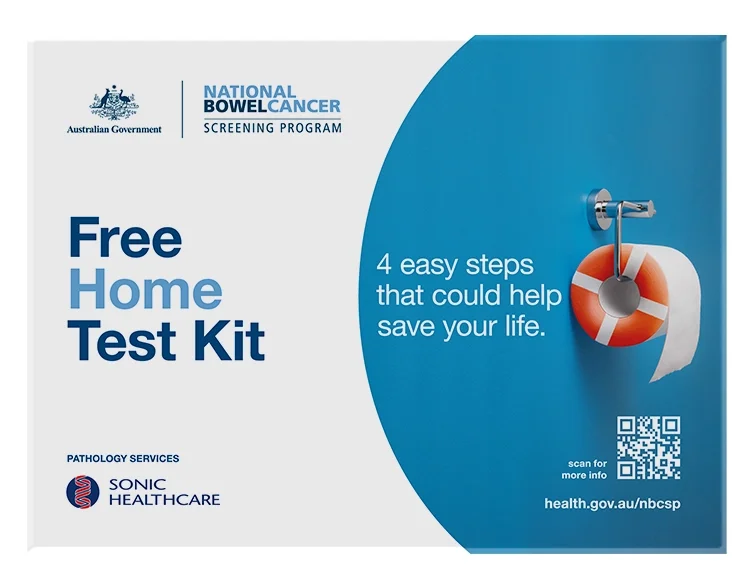What is bowel cancer?
Bowel cancer is the second biggest cause of cancer death in Australia. You have an increased risk of bowel cancer as you age. It can develop without any family history and show no signs or symptoms.
It can happen in any part of the colon or rectum (parts of the lower digestive system). Bowel cancer cells can start growing from the inner lining of the bowel or from small growths on the bowel wall called adenomas or polyps.
If it is not found, bowel cancer can spread into the wall of the bowel, lymph nodes (glands) and then to other organs.
If found early, 90% of bowel cancers can be successfully treated. Don’t delay, do your bowel cancer test today!
What are the symptoms of bowel cancer?
Bowel screening can spot the early signs of bowel cancer before you notice signs or symptoms. Screening is the best way to find bowel cancer early. When we find bowel cancer early, successful treatment is more likely.
Bowel cancer can develop without signs. However, many people with bowel cancer do notice some signs or symptoms. Bowel cancer symptoms and signs can include:
- blood in your poo or in the toilet bowl
- a change in your toilet habits that doesn't go away for more than 3 weeks. This can include looser poos, severe constipation and/or if you need to poo more often than usual
- unexplained tiredness or weight loss
- stomach pain
If you notice any of these, it is important that you speak to your GP straight away.
The Australian Government has lowered the eligible screening age for the National Bowel Cancer Screening Program from 50 to 45. People aged 45 to 49 can request their first free screening kit by completing a webform or calling 1800 627 701. People aged 50 to 74 will continue to receive a free home test kit in the mail every two years.

The Test

The bowel screening test is simple, free, and completed at home. If you’re aged 45 to 74, you can screen with the program.
The Australian Government has lowered the eligible screening age from 50 to 45. People aged 45 to 49 can request a free screening kit be mailed to them.
If you have lost or didn’t receive a kit, you can re-order one.
Screening for bowel cancer involves an at-home test called a faecal occult blood test (FOBT). The faecal occult blood test looks for traces of blood in the poo which are invisible to the human eye and could be a sign of bowel cancer.
How can I reduce my risk?
We don't know the exact cause of bowel cancer, but research shows that people with certain risk factors are more likely to develop the disease. Some things that can increase your risk of developing bowel cancer include:
- age
- family history
- inflammatory bowel disease
- poor diet
- physical inactivity
- alcohol
- obesity
- smoking.
You can reduce your bowel cancer risk by:
- quitting smoking
- being active
- enjoying a healthy diet with plenty of fresh fruit and vegetables
- limiting red and processed meats
- limiting alcohol
- maintaining a healthy body weight
Find more information on bowel cancer and prevention here.
What if I have symptoms?
It does not matter what age you are, if you experience any signs or symptoms you should speak to your GP These signs can include a change in bowel habits, blood in your poo, stomach pain, unexplained fatigue or weight loss.
What if I have a family history of bowel cancer?
You may have a significant family history of bowel cancer, if:
- A close relative (parent, brother, sister or child) developed bowel cancer at a young age (under 55 years); or
- More than one close relative in your family has had bowel cancer at any age.
More than 75 per cent of people who develop bowel cancer do not have a family history of the disease. If you think you have a family history of bowel cancer, speak to your GP or health care professional. They can talk to you about the risk of developing the disease. You can also visit the National Bowel Cancer Screening Program website.
